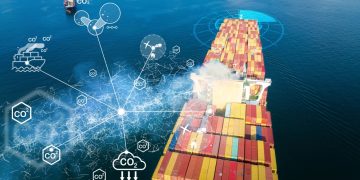Despite the rise of Low Earth Orbit (LEO) satellite networks, there will still be a place for traditional communication solutions such as email in the increasingly connected and digital maritime industry. Alex Zervos, Regional Head of Development at GTMaritime, explains why.
As more equipment and service providers work towards digitalising the shipping industry, there is an intensifying need for reliable, robust and – most importantly – low-cost broadband communications. Orbiting the earth between 800km to 1,600km above the earth’s surface and at speeds that can see each satellite complete a full orbit in less than two hours, small LEO satellites offer limited coverage on their own. However, in a constellation with hundreds of other satellites, LEO payloads offer the potential for full coverage of the earth’s surface, including polar regions.
Today, maritime email communication is critical for ships to maintain contact with the shore and other vessels, so it is essential that the email solution installed onboard is reliable and able to provide a stable connection.
Rising competition for the maritime dollar from LEO satellite networks has seen many industry stakeholders start to ask whether traditional maritime communications – such as email – will still be required; or will they become obsolete, as ship owners and managers seek solutions based on standard shore-based communication and data transfer?
However, while LEO satellite networks undoubtedly offer fast internet speeds, they are often susceptible to interference from atmospheric conditions, which can cause frequent disruptions to the signal. “In this situation, standard shore-based communication solutions would need to restart the transmission once connectivity is restored, whereas solutions that have been optimised for maritime communications – such as GTMailPlus – usually offer break point restart as standard, ensuring that the transmission can restart from the point of interruption,” points out Zervos.
In fact, there are several other factors to weigh-up when considering LEOs, and regardless of advances in technology, maritime optimised solutions for communications, security, data transfer and other solutions will still be required, for the same reasons they are required over traditional networks.
Reliable and Secure Communications
GTMailPlus is the leading secure maritime email service delivered by GTMaritime. It has been designed specifically for use in demanding remote environments and includes a suite of applications that have been fully optimised for maritime satellite communications.
In addition to reliability, Zervos believes security is a non-negotiable for digital maritime solutions to protect crew and assets. Maritime email solutions offer enhanced security features that protect sensitive data and communications from cyber threats, with many solutions using encryption and other advanced security measures to prevent unauthorized access to email accounts and data.
“To help reduce the risk of a cyber incident through a ship’s email server, GTMailPlus includes an enterprise-grade security suite as standard to provide robust protection from threats, including zero-day attacks. It also has applications for Anti-Phishing, Antivirus, Spam Management and Advanced Threat Protection, all of which have been optimised to operate over satellite networks whilst at sea,” adds Zervos.
GTMaritime also offers a range of endpoint solutions that have been specifically designed for vessels, providing scalable, intelligent and strong protection without impacting productivity. Provided in partnership with CrowdStrike, customers receive an end point detection and response (EDR) solution with AI based next generation anti-virus. This includes the ability to isolate single devices to protect the rest of the network, along with access to support 24/7 in the event of an incident.
Connectivity Considerations
Connectivity is also a key consideration. Whilst LEO satellite networks promise to provide wide coverage, at the moment this is not global. Vessels will therefore still require a solution which not only works over the LEO network but also over more traditional low bandwidth networks. Furthermore, regardless of the type of network being used, vessels still need to compress and throttle email and data during certain periods, while in port for example, but LEO networks currently cap utilisation and therefore limit connectivity and availability further.
As previously mentioned, cost is one of the most important considerations, with ship owners and managers looking for low-cost broadband communications to stay connected and benefit from new digital solutions coming to market.
In today’s real world, LEO satellite networks are still in their infancy, making early adoption unsuitable for smaller shipping companies
…says Zervos. “Maritime email solutions, on the other hand, are tried and tested, offering a more cost-effective and secure solution that can be customized to meet the specific needs of individual ships. This can include providing a single dashboard for management of fleetwide communications, or allowing integration with solutions such as Microsoft365, GMail, Mimecast and more, whilst still providing the stability, security and optimisation vessels require.
Maritime email solutions are also designed to be user-friendly and easy to operate, even for crew members who are not particularly tech-savvy. They typically offer a simple user interface that is easy to navigate, and can be accessed from a range of devices, including smartphones and laptops.
While LEO satellite networks can offer fast internet speeds, they still have some of the same challenges as traditional maritime networks and are also not available 100% of the time. Despite the introduction of LEO networks, there is every reason to expect that maritime optimised solutions will still be required to ensure communications are always available and to meet the unique communication needs of vessels at sea.
The views presented are only those of the author and do not necessarily reflect those of SAFETY4SEA and are for information sharing and discussion purposes only.

































































